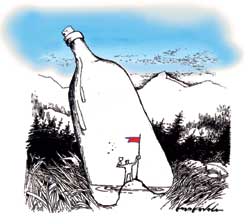 Look at it every which way and it becomes apparent that even if the Maoists are wiped out, the government will still have to tackle the political cause that the insurgents represent. To do so, it must not only fight a war, it also needs to unleash development on a war footing. Unfortunately, this government seems incapable of multi-tasking.
Look at it every which way and it becomes apparent that even if the Maoists are wiped out, the government will still have to tackle the political cause that the insurgents represent. To do so, it must not only fight a war, it also needs to unleash development on a war footing. Unfortunately, this government seems incapable of multi-tasking. Seven years ago, the Maoists gave up on parliamentary democracy within a constitutional monarchy and dedicated itself to the violent overthrow of both. In the beginning it seemed that the comrades truly wanted to change things: their political agenda was populist and they organised the grassroots. But it gradually became clear that their resort to violence was only a shortcut to power rather than a means of societal transformation.
The underground group has murky links to the international revolutionary movement (see p. 6), and wanted to carry on where Mao Tse-tung left off. Nepal became a petridish where this experiment in world revolution was to be carried out. There is no proof of what support, if any, our rebels receive from their comrades-in-arms elsewhere. But there is clearly a reciprocity: in the early 1990s the walls of Kathmandu and the rocks on the hill trails had huge red graffiti that said "Long Live the Shining Path" and "Release Comrade Gonzalo". Peru is at relative peace while Shining Path leader Abimael Guzman is in jail. The Senderistas, meanwhile, have reincarnated themselves in the Himalaya.
On their Internet site, the international revolutionaries say they chose Nepal because the "objective conditions" were ripest here. Desperately poor and ruled by an elite that couldn't care less for the welfare of its citizens, Nepal is a country where socio-economic disparities are remarkable even by South Asian standards.
When they decided to launch a "people's war" in February 1996, the Maoists disavowed the democratic space they had gained four years earlier. Their decision was so wrenching that it split the ultra-Left parties, some of which were not convinced about the timing or the justification for armed struggle. Although sworn enemies, the Maoists and the reactionary right became allies in trying to bring down democracy and turning the clock back to pre-1990.
Meanwhile, the democracy warriors were becoming freedom's greatest enemies. As soon as they were elected to power, they proceeded to undo everything they had struggled for, to discredit themselves and the system they fought to put in place. Their incessant bickering, their mindless plunder, and the sidelining within political parties of just about everyone who had integrity, vision and commitment paved the way for the Maoists' challenge to democracy.
Can a political system be so rotten that only a violent struggle to destroy everything and rebuild from scratch is the solution? Or are there less destructive options that use institutions of checks and balances to curb the excesses of parliamentary democracy?
It is one of the fundamental tenets of revolutionary movements that everything has to be destroyed before it can be rebuilt. But many revolutions have floundered because violence becomes an end in itself, breeding more and more violence until the revolution devours its own children.
Yet for all that, peace may still be possible, if it were only the internal dynamics of political forces within Nepal that were dictating events. Unfortunately there are worrying signs that the neighbourhood is eyeing us keenly. Is this war going to threaten Nepal's very existence? Does Prachanda know this? If so, why is he taking the nation in that direction?
Prime Minister Sher Bahadur Deuba's forceful assertion last week that Nepal can fight its own war sent the right signals. We have only to see the ruins and carnage of Afghanistan to prove, if any proof was needed, of what happens to countries that become chessboards for the mighty. The other, even more unspeakable, example is Cambodia where a superpower that is today the avowed defender of human rights backed a genocidal regime just because it happened to be the enemy of its rival superpower.
We created this mess. We have to solve it. But let us harbour no illusions that military force alone will do the trick. We have said it often in this space, and we will say it again: what we need is a campaign to give citizens the hope that genuinely participatory democracy offers the only route to peace and progress.


